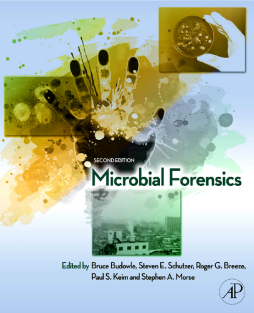
BOOK
Microbial Forensics
Bruce Budowle | Steven E. Schutzer | Roger G. Breeze | Paul S. Keim | Stephen A. Morse
(2010)
Additional Information
Book Details
Abstract
Microbial Forensics is a rapidly evolving scientific discipline. In the last decade, and particularly due to the anthrax letter attacks in the United States, microbial forensics has become more formalized and has played an increasingly greater role in crime investigations. This has brought renewed interest, development and application of new technologies, and new rules of forensic and policy engagement. It has many applications ranging from biodefense, criminal investigations, providing intelligence information, making society more secure, and helping protect precious resources, particularly human life. A combination of diverse areas is investigated, including the major disciplines of biology, microbiology, medicine, chemistry, physics, statistics, population genetics, and computer science.
Microbial Forensics, Second Edition is fully revised and updated and serves as a complete reference of the discipline. It describes the advances, as well as the challenges and opportunities ahead, and will be integral in applying science to help solve future biocrimes.
- A collection of microbiology, virology, toxicology and mycology as it relates to forensics, in one reference
- New and expanded content to include statistical analysis of forensic data and legal admissibility and the standards of evidence, to name a few
- Includes research information and application of that research to crime scene analysis, which will allow practitioners to understand and apply the knowledge to their practice with ease
"The second edition of Microbial Forensics provides a comprehensive overview of this emerging field, highlighting how epidemiological investigations must be conducted to provide evidence that can be used in legal proceedings where attribution is key. The book provides valuable insights into investigations of prior attempts to spread disease intentionally and needed guidance for investigating future incidents. This book will be of great value to microbiologists and epidemiologists as well as to law enforcement officials for bringing emerging molecular methodologies into investigations of disease outbreaks, especially those that are intentional criminal and terrorist acts."-- Dr. Ronald M. Atlas, University of Louisville, KY, USA
